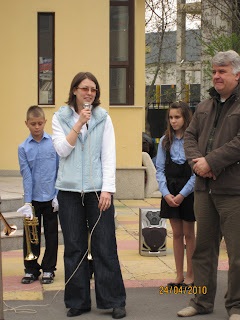
26/04/10
On the 24th and 25th of April in the Falkovets village the youth structures of GERB from the regions Vidin, Montana, Vratza and Pleven had their first regional political academy.
The main topics, which were in the base of the two day training included: The principles of successful behavior, Political culture, How to communicate with the media and Non-verbal communication. The moderators of the academy were Lidia Kapitanova from MGERB Vidin and Slavi Pavlov from MGERB Pleven.
Vladimir Toshev – Member of Parliament in the 41st National Assembly from GERB from the Vidin region, attended the official opening. He greeted all of the participants with a few words. Among the special guests of the academy were Svetoslav Kazakov and Ivaylo Petkov from MGERB Sofia.
The first day started out with an exercise from the moderators, which had an ice-melting target and contributed to the good atmosphere and the activity of the participants. The program continued with training about management decisions and the successful management of a team, as well as an improvised introduction of every participant in front of a camera, which had the target to improve communication with the media.
The second day started with the conducting of two debates connected with problems important for society in the country. The youths were divided into four teams, as each of them had to defend their thesis in front of their opponents. The moderators gave marks to the youths for teamwork and pointed out flaws with the target of improvement.
The program ended with some important tips and conclusions about the accomplished in the two days of work and ideas and proposals from the participants about upcoming trainings.
On the 24th and 25th of April in the Falkovets village the youth structures of GERB from the regions Vidin, Montana, Vratza and Pleven had their first regional political academy.
The main topics, which were in the base of the two day training included: The principles of successful behavior, Political culture, How to communicate with the media and Non-verbal communication. The moderators of the academy were Lidia Kapitanova from MGERB Vidin and Slavi Pavlov from MGERB Pleven.
Vladimir Toshev – Member of Parliament in the 41st National Assembly from GERB from the Vidin region, attended the official opening. He greeted all of the participants with a few words. Among the special guests of the academy were Svetoslav Kazakov and Ivaylo Petkov from MGERB Sofia.
The first day started out with an exercise from the moderators, which had an ice-melting target and contributed to the good atmosphere and the activity of the participants. The program continued with training about management decisions and the successful management of a team, as well as an improvised introduction of every participant in front of a camera, which had the target to improve communication with the media.
The second day started with the conducting of two debates connected with problems important for society in the country. The youths were divided into four teams, as each of them had to defend their thesis in front of their opponents. The moderators gave marks to the youths for teamwork and pointed out flaws with the target of improvement.
The program ended with some important tips and conclusions about the accomplished in the two days of work and ideas and proposals from the participants about upcoming trainings.












